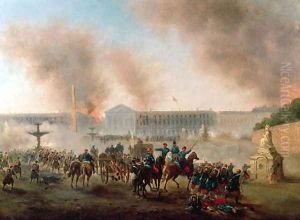Boulanger Paintings
Gustave Clarence Rodolphe Boulanger, commonly known as Gustave Boulanger, was a distinguished French figure painter born on April 25, 1855, in Paris. Boulanger is best known for his depictions of scenes from the daily life of Ancient Rome, which reflect the 19th-century French fascination with historical and exotic subjects. His academic painting style was characterized by its technical precision and its often romantic portrayal of antiquity.
Boulanger studied under Pierre-Jules Jollivet and Paul Delaroche, and later at the École des Beaux-Arts in Paris under Jean-Léon Gérôme, who had a significant influence on his style and focus on historical accuracy in costumes and settings. He won the prestigious Prix de Rome in 1884, which granted him the opportunity to study at the French Academy in Rome, located in the Villa Medici. This experience deepened his interest in classical subjects and the ancient world.
During his career, Boulanger exhibited at the Paris Salon, where he achieved considerable success. He was known for his masterful use of light and texture, as well as his ability to capture the spirit of the scenes he depicted. His paintings often included elaborate architectural backgrounds and a keen attention to the details of fabrics and materials, earning him a reputation for his realism and craftsmanship.
Boulanger's notable works include 'The Slave Market', 'Cleopatra and Caesar', and 'The Rehearsal in the House of the Poet Tragic'. His oeuvre includes not only historical scenes but also portraits and orientalist subjects. Despite the popularity of his work during his lifetime, Boulanger's adherence to the academic style eventually fell out of favor with the advent of modernist movements.
Beyond painting, Boulanger also contributed to the decorative arts, creating designs for mosaics and stained glass. He was a respected teacher and influenced a number of younger artists. His legacy is preserved in part through his works housed in various museums and collections around the world.
Gustave Boulanger's impact on the French academic tradition was notable, and his works continue to be studied for their historical depiction of ancient life and their embodiment of 19th-century academic art. He passed away on September 25, 1938, in Paris.
